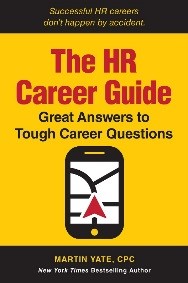Best-selling author Martin Yate, a career coach and former HR professional, takes your questions each week about how to further your career in HR. Contact him at the e-mail address at the end of this column.
I love the people in our company; however, management has changed as of January 2018. I am now reporting to our CFO, who is a woman, and we have clashed at times due to our strong personalities. In my first year on the job, she told someone that if she were my boss, she would fire me. I confronted her at the time, and she said she could not recall saying this. It was a good conversation.
I do not feel like I am compensated fairly or appreciated. The former CEO said the company isn't making money. The new CFO has control of my salary and bonuses.
I have an interview coming up soon, and I have been trying to figure out what I should say about why I want to leave my job. Any advice would be appreciated.
Answering the "reason for leaving" (RFL) is always challenging, especially when you have causes for frustration and grievance. Let's clarify what you ultimately desire: You want to strengthen your ability to turn the interview into a job offer.
Your focus should be on what you can do for the company, not what the company can do for you. Your goal in going to any interview is not to decide if you want the job, because you have nothing to consider until an offer is on the table. Instead, your objective is to show the interviewer the skills and capabilities you bring to the table that are relevant to the deliverables of the job. This increases your odds of getting an offer, while simultaneously building your overall interviewing skills.
With this in mind, you don't want to do or say anything that can get in the way of an offer being made. Consequently, you should stay away from topics such as religion, politics and sex; you mentioned the gender of your current boss in your question above, but it has no bearing on any interviews you have. Neither should you say anything critical of a current employer, because criticism of current management can be interpreted as past behavior predicting future behavior and no one is going to hire a candidate who gives any signs of sowing discord.
The RFL is what's referred to as a "check box" question: Give a short, reasonable explanation, the interviewer checks off the question, and you move on. In Shakespeare's Hamlet is a quote we would all do well to remember in these situations: "Methinks thou dost protest too much." In this context, it means that the more you ramble, the less likely the interviewer will believe you.
You should leave out the back story entirely, and give a defensible and short answer. This will require some thought and practice. As I see it, you have worked hard and conscientiously for a long time. You like the job, your colleagues and the company. A colleague in senior management has told you that the company isn't making money. While this obviously causes concerns about job stability, your main reason for leaving is that you have gained valuable experience in delivering above and beyond your mandate by creating an effective HR function from scratch that operates seamlessly in 16 locations, and now feels like a perfect time to pursue new challenges and make more money.
Think through the actual points you will make and write them down as bullet points. Don't write sentences; they're harder to remember. Rehearse giving your answer aloud and practice until you can give that answer in under a minute. Then practice again looking yourself in the mirror as you do so. This will enable you to get comfortable with your answer and see yourself as the interviewer will see you.
Have a question for Martin about advancing or managing your career? From big issues to small, please feel free to e-mail your queries to YourCareerQA@shrm.org. We'll only publish your first name and city, unless you prefer to remain anonymous—just let us know.


Packed with practical, honest, real-world guidance for successfully navigating common HR career challenges, Martin Yate's new book The HR Career Guide: Great Answers to Tough Career Questions is available at the SHRMStore. Order your copy today!
Advertisement
An organization run by AI is not a futuristic concept. Such technology is already a part of many workplaces and will continue to shape the labor market and HR. Here's how employers and employees can successfully manage generative AI and other AI-powered systems.
Advertisement



